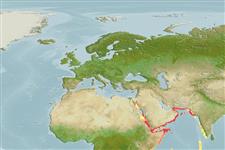Teleostei (teleosts) >
Acropomatiformes (Oceanic basses) >
Champsodontidae (Crocodile toothfishes)
Etymology: Champsodon: Greek, champso = crocodile, voracious predator + Greek, odous = teeth (Ref. 45335).
More on author: Regan.
Environment: milieu / climate zone / depth range / distribution range
Ecology
Marine; bathydemersal; depth range 135 - 1120 m (Ref. 9942). Deep-water
Western Indian Ocean: Dahlak Archipelago, Gulf of Suez, Gulf of Aqaba, and has been collected in the central Red Sea. It is not clear whether there are two separate populations, one of the deep water (360-380 m) and one of the deep sea (1085-1120 m) or whether vertical migrations of 700 m or more take place. Gene flow occurs between the Gulf of Aden, the Red Sea, and the Gulf of Aqaba.
Size / Weight / Age
Maturity: Lm ? range ? - ? cm
Max length : 10.6 cm SL male/unsexed; (Ref. 30343)
Life cycle and mating behavior
Maturities | Reproduction | Spawnings | Egg(s) | Fecundities | Larvae
Nemeth, D., 1994. Systematics and distribution of fishes of the family Champsodontidae (Teleostei: Perciformes), with descriptions of three new species. Copeia 1994(2):347-371. (Ref. 30434)
IUCN Red List Status (Ref. 130435)
Threat to humans
Harmless
Human uses
Tools
Special reports
Download XML
Internet sources
Estimates based on models
Preferred temperature (Ref.
123201): 10.5 - 21.8, mean 14.4 °C (based on 82 cells).
Phylogenetic diversity index (Ref.
82804): PD
50 = 0.5002 [Uniqueness, from 0.5 = low to 2.0 = high].
Bayesian length-weight: a=0.00447 (0.00181 - 0.01102), b=3.12 (2.90 - 3.34), in cm total length, based on LWR estimates for this (Sub)family-body shape (Ref.
93245).
Trophic level (Ref.
69278): 4.1 ±0.5 se; based on size and trophs of closest relatives
Fishing Vulnerability (Ref.
59153): Low vulnerability (10 of 100).
